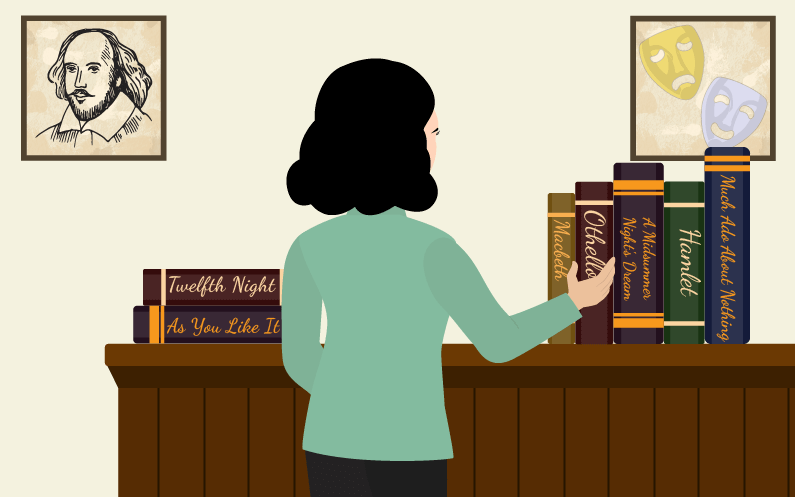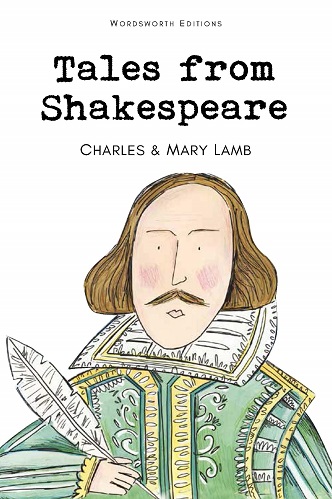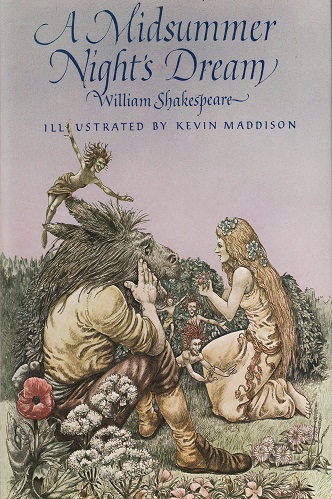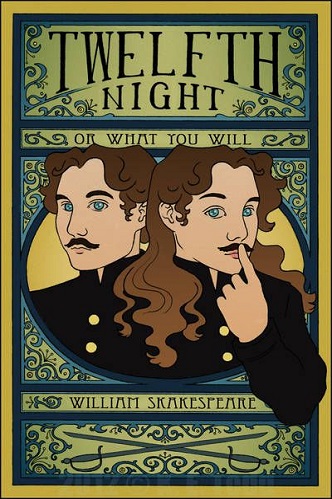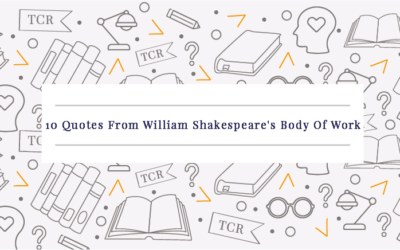Essay
Why I Read Shakespeare
I’d known from a very young age that I was going to study English Literature. While this was partly because it seemed appropriately academic at the time (I was really young!), it was primarily due to a deep and abiding love for the language – one that continued as I grew older. Upon declaring this to my family, I was told that I’d need to read the ‘right’ kind of books to achieve this goal (in hindsight, I realise how they’d turned this into a teachable moment). Reading the works of William Shakespeare was an expected box to check off of this list.
Now, before you think I was reading his original works at the age of 11, let me mention that I started off with the Charles and Mary Lamb version of Shakespeare’s works – Tales From Shakespeare. These were the abridged child-appropriate versions of his plays. And I hated them. Every plot seemed the same, the characters didn’t appeal, and I couldn’t understand the fuss about Shakespeare.
As much as I regretted the fact that my English Literature degree would involve studying Shakespeare, it wasn’t enough to make me change my mind. I am infinitely grateful for this because the three years spent in getting my degree showed me why Shakespeare is considered to be one of the leading figures in literature. More than that, those three years made me not only enjoy his works but also appreciate the layers within his writing.
Listen, Then Read
Let’s face facts here. Shakespeare isn’t easy to read. The words aren’t what we’re used to, the sentence structure seems strange, and the ‘doth’s and ‘thou’s and ‘yonder’s do go over the head. But his plays weren’t actually written to be read. He wrote at a time when audiences were ‘more attuned to words and aurality’. They went to experience the plays live and hear the dialogues being recited by the actors on stage.
I first realised this after watching a production of A Midsummer Night’s Dream in my first year in college. I’d read the play by then, mainly because I had to, without really enjoying it. And then, this production played out in front of my eyes, and I heard the actors speak the lines from the text. It was almost a eureka moment for me when I went back home and read the text. Suddenly, it all made sense. The words became easier to understand and that was when I was able to move on to exploring the layers within the play, finally understanding what it was about. I appreciated the themes explored, the wit and humour, the significance of a play-within-a-play, and so on.
Since then, I have done my best to incorporate the aural element while reading Shakespeare, and it has never failed me. Listening to the words, whether by the actors on stage or on a screen or simply by reading aloud, has always opened up a window into the play, helping me understand the story and everything along with it.
For All Time
According to Ben Jonson, Shakespeare’s work was ‘not of an age but for all time’ – a statement that went on to become rather prophetic. Shakespeare’s works were published over 400 years ago, and yet they continue to be read, studied, performed, quoted and adapted even today. His plays transcend the era they were written for and throw up teachable examples of the intricacies of hubris, the fluidity of desire, the dangers of blind ambition, and the tussle between loyalty and guilt.
Despite the time that’s passed since they were written, his works still matter because his plots still remain relevant and his characters are the kind we continue to identify with. Samuel Johnson, in his preface to The Plays Of William Shakespeare, mentioned, ‘His characters…are the genuine progeny of common humanity, such as the world will always supply, and observation will always find.’
I see this ringing true in his plays that are emotional, witty, tragic, or hilarious. And in the characters as we recognise Othello’s envy and Macbeth’s ambition; we understand the kind of overwhelming love Romeo and Juliet feel for one another; we sympathise with Lear’s decline; we feel Hamlet’s anguish and Ophelia’s distress. His characters are familiar, and yet they aren’t – and it is this dichotomy that manages to catch us unaware, making his works endlessly fascinating.
Themes And Ideas That Resonate
My fascination with his writing deepened as I grew older and managed to understand the layers within his plays. A play like Twelfth Night opened my eyes to the idea of gender as a social construct due to its exploration of gender roles and the expectations associated there.
Shakespeare employs the tool of cross dressing to show the possibility of same sex attraction between Lady Olivia and Viola, and Duke Orsino and Cesario. We see Lady Olivia falling in love with Viola, who is dressed as a man, but still resembles a woman. (As Malvolio notes, ‘not yet old enough for a man, not young enough for a boy…One would think his mother’s milk was scarce out of him’.) This unthreatening nature of Viola’s assumed masculinity is what endears her to Olivia. Similarly, Duke Orsino easily manages to shift his deep friendship with Cesario to romantic love when he discovers the latter to be Viola, and yet is in a rush for her to take off her male disguise.
This play, then, stands out as a wonderful example of the potential ambiguity of gender and how the distinctions between male/female and homosexual/heterosexual aren’t as absolute as a rigid society might want us to believe. It also makes us realise that perhaps gender can be determined by the way we act and think, rather than the sexual organs we are born with.
Othello, on the other hand, taught me about internalised racism that feels more relevant today than it might have been in the 17th century. Considered to be one of Shakespeare’s four great tragedies, this play presents a searing critique of racial and sexual injustice through the doomed marriage between Othello, the (black) Moor of Venice, and Desdemona, an upper-class white girl.
Othello and Desdemona choose to marry, undeterred by paternal wrath and societal disapproval. In other words, they choose to act as if they were already free citizens of a truly civilised future, rather than prisoners of a time where racial prejudice and gendered sexual inequality ran rampant to the point of tainting their heroic hearts. As Brabantio (a Venetian senator and Desdemona’s father) tells the Senate, ‘For if such actions may have passage free, Bond-slaves and pagans shall our statesmen be’. He argues that the State turning a blind eye to this outrage ensures a tacit approval of equality of all classes.
Not only is Othello (and, by extension, Desdemona) required to navigate the machinations of Iago, the antagonist of the play and the standard-bearer of Othello’s troops, he is also forced to face the wrath of a society whose status quo and world-view has been shaken up because he dared to marry someone well beyond his socially-accepted circle. Already on the defensive due to social prejudices, Othello becomes an easy target for Iago to manipulate and destroy.
We talk of tolerance and about accepting people for who they are today yet remain shackled by social constructs and existing prejudices. Look at how we function – a person choosing to embrace a sexuality that goes beyond what’s traditionally accepted gets penalised or is forced to deal with unwanted scrutiny. Our advertising still promotes a certain colour of skin as being more acceptable. Racial prejudice reigns supreme and couples in inter-caste and inter-religious marriages are treated with disapproval and ostracisation (often leading to death).
It makes me wonder if we have learned anything in spite of all the progress we made over the 400+ years since Shakespeare’s plays were written. Perhaps this is why I go back to his writing. To remember authors who spoke of these issues centuries ago, and to hope that we might, at some point, look back and learn.
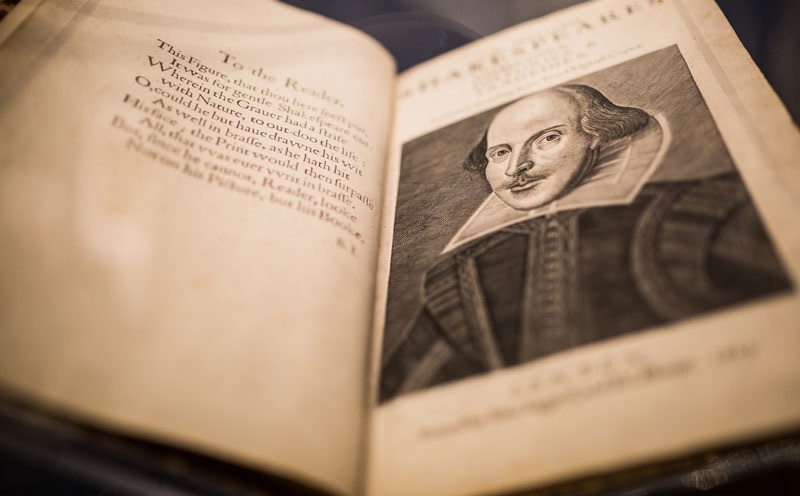
(Image via Folger)
Why read Shakespeare at all? This remains an oft-asked question today. To the ones who ask, I say – read him to appreciate his stories. For his still-relevant themes and characters. For the tragedy, for the comedy, and for the history.
If these aren’t enough to make one appreciate his contribution to literature, read him for his contribution to our daily conversation. Chances are high that we’ve all used Shakespearean phrases at some point in our day. If you’ve ever said ‘tongue-tied’, ‘green-eyed monster’, ‘to wear one’s heart on one’s sleeve’, ‘it’s Greek to me’, ‘neither here nor there’, then you’ve quoted Shakespeare. His phrases were so unconventional that they managed to become an intrinsic part of the English language. Today, we’re so steeped in Shakespeare that we don’t even realise it anymore. Isn’t that reason enough to read his works?
I have been fortunate to have been given access to different tools that have enhanced my appreciation for the Bard’s works – be it through wonderful stage productions, cinematic adaptations, or engaged professors who shared their love for his writing with me. It is because of this that I read his works and continue to enjoy the new meanings they still manage to throw up for me.

A love for the written word has led Oishani to structure her life around reading. Books introduced her to a world filled with so many possibilities, and helped her understand the power of a well-written story. With an educational background in English Literature and Film & Television Studies, she has worked as the editor for an arts magazine in the past. She believes in the healing powers of a perfectly brewed cup of coffee and the chance to explore a new city. And, no matter where she might be, her Kindle (loaded with books) is never too far from her person.
She is the editor at The Curious Reader. Read her pieces, here.

